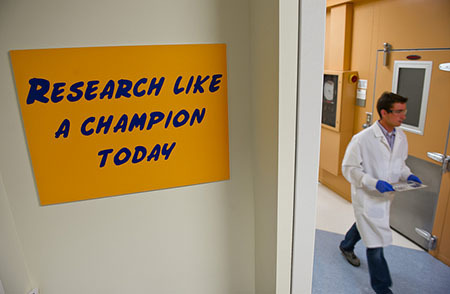Faculty Experts

The Center for Stem Cells and Regenerative Medicine is an interdisciplinary enterprise, bringing together faculty from across three colleges and the Law School at the University of Notre Dame to tackle important questions related to stem cells. Utilizing a wide variety of organisms, research on the fundamental processes adult stem cells and induced pluripotent stem (iPS) cells, as well as their application in regenerative medicine is being explored. Additionally, key legal, ethical, and moral questions associated with the use and application of stem cells are being examined.
In the College of Science, David R. Hyde is examining the mechanisms by which endogenous adult stem cells can regenerate neurons in the retina and brain, which might lead to potential treatments for a number of neurological diseases. Richard Dahl is interested in how gene expression changes regulate blood development and how perturbations in gene expression may result in the development of leukemia cells. Malcolm J. Fraser Jr. is exploring the application of iPS cells to treat a variety of devastating diseases. Paul W. Huber is exploring genomics and proteomics of early development. Athanasia Panopoulos conducts research on induced pluripotent stem (iPS) cells, with a focus on how the process of reprogramming somatic cells could open new ways to treat cancer and blood diseases. Matthew J. Ravosa is studying evolutionary morphology, mechanobiology, development, aging and pathobiology of the vertebrate skull, feeding apparatus, and musculoskeletal system. Robert A. Schulz is studying how the niche cells, which signal and support the adult stem cells, regulate the self-renewal and differentiation of blood-related cells. Cody J. Smith is studying how to build the nervous system during development and regeneration. By examining cells in development and regeneration contexts, we hope to gain insight into how functional circuits are created, maintained, and change during development, disease, and regeneration. Kevin T. Vaughan is studying the fundamental process of how stem cells divide to either self-renew or to become another type of cell. Rebecca Wingert is studying how the kidney develops and how endogenous adult stem cells can regenerate the damaged kidney, which could lead to a treatment of a variety of kidney diseases. Siyuan Zhang is unraveling the dynamic cross-talk between tumor and somatic stem cells in the tumor microenvironment.
In the College of Engineering, Joel Boerckel is interested in understanding how cells sense mechanical stimuli and how these cues influence development and tissue regeneration. Donny Hanjaya-Putra works at the interface of engineering and medicine, with a motivation on making stem cell and molecular therapies as an effective method to model and treat diseases. Glen Niebur is studying how the physical environment affects adult stem cells in the bone marrow, which will lead to a better understanding of how these cells respond to different environmental conditions, such as exercise and stress. Ryan K. Roeder explores synthetic biomaterial scaffolds that can direct the growth and differentiation of adult stem cells while supporting vascularization and tissue regeneration. Dr. Roeder also investigates nanoparticles designed to target cells for imaging and/or drug delivery. Gregory Timp's research interests are interdisciplinary ranging from: the transfection of somatic cells with a nanopore in a solid-state membrane to produce Induced Pluripotent Stem Cells (iPSCs), to protein sequencing with picometer-diameter pores, to tissue engineering of capillary models for study of cancer metastases and hypertension. Jeremiah Zartman utilizes a combination of experimental and computational modeling approaches to discover the underlying mechanisms governing epithelial tissue growth and homeostasis with implications for regenerative medicine. Pinar Zorlutuna's research explores designing biomimetic environments for understanding and controlling cell behavior, and cell-cell and cell-environment interactions using tissue engineering, genetic engineering, and micro- and nanotechnology, with particular emphasis on designing systems for co-culturing different cell types in a physiologically relevant manner for engineering complex tissues and for directing stem cell differentiation.
In the College of Arts and Letters, Phillip Sloan is studying how theology, philosophy, ethical theory, and history shapes our views on the research use of stem cells and their potential application to medicine.
In the Law School, O. Carter Snead studies the ethical, legal, and social questions of stem cell research and their use in medicine.